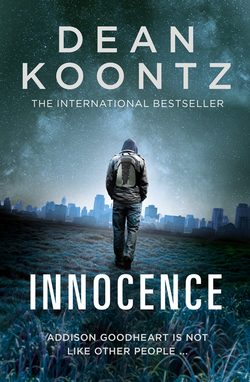Читать книгу Innocence - Dean Koontz, Dean Koontz - Страница 10
Four
ОглавлениеI CALLED HIM FATHER BECAUSE HE HAD BEEN THE closest thing to a father that I had ever known. He was not my true father.
According to my mother, my real father loved freedom more than he loved her. Two weeks before I was born, he walked out and never walked back in, off to the sea, she said, or to some far jungle, a restless man who traveled to find himself but lost himself instead.
On the night that I was born, a violent wind shook the little house, shook the forest, even shook, she said, the mountain that the forest mantled. The windstorm quarreled across the roof, insisted at the windows, rattled the door as if determined to intrude into the place where I was born.
When I entered the world, the twenty-year-old daughter of the midwife fled the bedroom in fright. Weeping, she took refuge in the kitchen.
When the midwife tried to smother me in the birthing blanket, my mother, although weakened by a difficult labor, drew a handgun from a nightstand drawer and, with a threat, saved me from being murdered.
Later, in the calm of morning, all the birds were gone, as though they had been blown out of the trees and swept to the edge of the continent. They didn’t return for three days: first the sparrows and the swifts, then the crows and hawks, and last of all the owls.
The midwife and her daughter kept the secret of my existence, either because they feared being accused of attempted homicide or because they could sleep well only if they forgot that I existed. They claimed I was born dead, and my mother confirmed their story.
I lived eight years on the mountain, sleeping as often as not in that cozy little house at the dead end of the narrow dirt track. In all that time, until the afternoon of the day I left, I saw no other human being but my blessed mother.
Eventually the cloistered spaces of the forest were mine to roam at an age when most children would have been denied the wilds. But I had great strength and uncanny intuition and a kind of kinship with Nature, as if the sap of the trees and the blood of the animals were in my DNA, and my mother felt more at peace when I was not in the house. The shadowed woods by day and the moonlit woods by night became as familiar to me as my own face in a mirror.
I knew the deer, the squirrels, the birds in great variety, the wolves that appeared from—and vanished under—the graceful arcing ferns. My community was populated by feathered and furred creatures that traveled by wings or four swift feet.
In the bosky woodlands and in the meadows that they encircled, also occasionally in our yard, I sometimes saw the Clears and the Fogs, as I came to call them. I didn’t know what they might be, but I knew intuitively that my dear mother had never seen them, because she’d never spoken of them. I never mentioned them to her, because I knew that hearing of them would distress her and cause her to worry about me even more than she already did.
Later, I would see the Clears and Fogs in the city, too. And I gradually came to understand their nature, as I will explain later.
Anyway, in those years, I was happy, as to one extent or another I have always been happy. The forest was not a wilderness to me, but served instead as my private garden, comforting in spite of its vastness, and endlessly mysterious.
The more familiar that a place becomes, the more mysterious it becomes, as well, if you are alert to the truth of things. I have found this to be the case all of my life.
Shortly after my eighth birthday, my mother would not have me in the house anymore. She could not sleep in my presence. She could not maintain an appetite, and thus lost weight. She didn’t want me nearby in the woods, either, in part because the thought of me at home in the forest reminded her that she was not welcome there in the way that I was, but also in part because of the hunter. And so I had to leave.
I couldn’t blame her. I loved her.
She tried hard to love me, and to an extent she did. But I was a unique burden. Although I am always happy—or at least not unhappy—I made her terribly sad. The sadness was slowly killing her.
